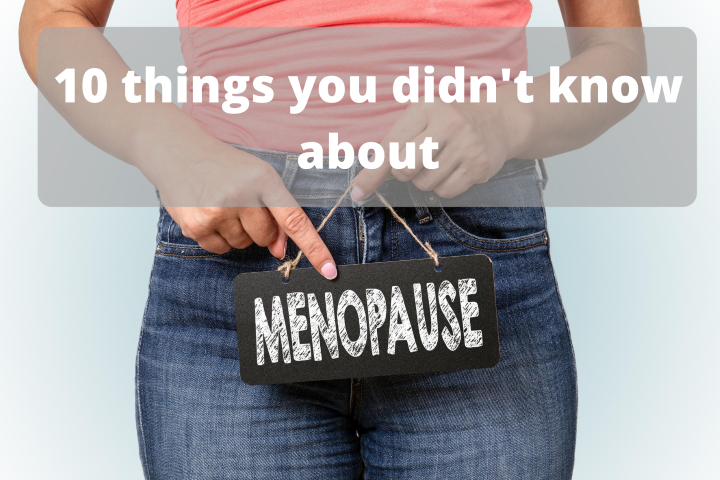And while menopause is inevitable, the suffering that comes with it is not. By clarifying some of the myths, fears, and confusion around menopause, we hope to assist you and keep you informed.
It’s worth being aware of the following facts:
1. Perimenopause is the first sign that you’re entering the next stage in life
During perimenopause, your body will start providing helpful physical clues that you are entering menopause. And it could be years before your last menstrual period.
Some common, normal signs include irregular periods, hot flashes, vaginal dryness, sleep disturbances, thinning hair and mood swings.
2. Low oestrogen, the trouble maker
During menopause, declining oestrogen levels can have several effects on the body. The most common symptoms caused by lower oestrogen levels are: Weaker bones, thinning hair, hair loss, hot flashes, mood swings, vaginal dryness or increased risk of urinary tract infection (UTI).
3. Research has shown that up to 50% of women suffer from hair loss and thinning hair*
One reason for hair loss in women is female pattern hair loss, also referred to as androgenetic alopecia. This process is for the most part gradual, and can become significantly worse during and after the menopause.
The classic symptoms of hair loss (alopecia) include thinning hair, premature hair fall, visible parting and a receding hairline.
Men, too, are affected by androgenetic alopecia. Whilst men can suffer from a receding hairline as early as puberty, female hair commonly does not start thinning along the parting and leave the scalp visible until menopause.
In addition to common household remedies and medication, caffeine shampoos and tonics are a good alternative. The benefit of using these hair products is that they can be easily integrated into your daily life and have no side effects (e.g. Plantur 39 Phyto-Caffeine Shampoo).
4. One in five women will fall each year before she reaches the age of 60***
Between the ages of 40 and 60, women begin to experience a decrease in the ability to balance and a decrease in bone density. Both of these changes contribute to the likelihood of a fall and experiencing more severe outcomes after a fall.
Regular physical activity can help decrease several risk factors of getting injured from a fall.
5. Yoga can help reduce hot flashes
Some studies show that yoga along with tai chi and qigong (which involves meditation and a series of slow movements) may be effective in reducing the incidence of hot flashes in perimenopausal women.
6. Over 40% of relationships are impacted by menopause
When sex starts to hurt, women often withdraw from intimacy. The chasm gets bigger and intimacy stops altogether. Over half (58%)** are having less sex or avoiding it altogether as a result of vaginal dryness.
Vaginal dryness, unlike other symptoms of menopause, does not go away once a woman comes out the other side. But the good news is that over-the-counter products can help relieve vaginal dryness and make sex enjoyable again.
One of them is Dr. Wolff’s V-san , a hormone-free Moisturising cream. With no permanent solution, this has to be used daily, or before sex, moving forward.
7. Menopause symptoms don’t run in the family
The menopausal symptoms vary from one woman to the next, even in the same families. The age and rate of decline of ovarian function can differ tremendously.
This means you’ll need to take an individual approach to managing menopausal symptoms. What worked for your mother, sister, aunt or best friend may not work for you.
Talk to your doctor if you have any questions or concerns about menopause. They can help you understand your symptoms and find ways to manage them depending on your lifestyle.
8. Symptoms of menopause can be masked by birth control
It’s possible for the symptoms of menopause to be masked by birth control, which is something to consider. It’s still possible to fall pregnant during perimenopause, so don’t stop taking birth control just yet.
However, after a year without your regular period, it’s generally accepted that pregnancy will not be possible without medical intervention.
9. Will menopause ever end?
Menopause, perimenopause and post-menopause refer to several stages in a woman’s life when she stops getting her monthly period. These stages signal the end of a woman’s reproductive years.
Perimenopause is the first stage in this process and normally starts eight to 10 years before menopause. Menopause is the point when a woman no longer gets monthly periods for at least 12 months. Post-menopause is the stage that comes right after menopause.
10. Talking helps
You are not alone in this. Friends, family and medical professionals can offer support and guidance. There are also many Facebook groups that provide a safe space for exchange and support. Life during and after menopause isn’t much different from life during your reproductive years. Remember to eat right, exercise, and receive preventive healthcare.
** “Physiological changes in scalp, facial and body hair after the menopause: a cross-sectional population-based study of subjective changes” Ali,l;Wojnarowska, F.;Br. J. Dermatol. 2011, 164, 508-513.
**Source: Understanding vaginal dryness in the UK market, Monkey see, 2019
***https://www.menopause.org.au/health-info/fact-sheets/decreasing-the-risk-of-falls-and-fractures










